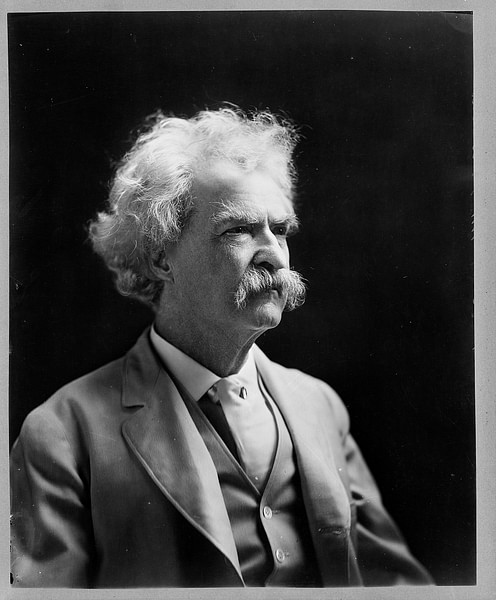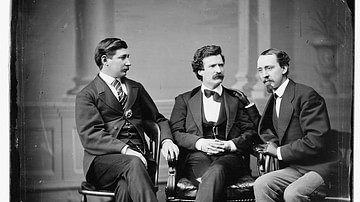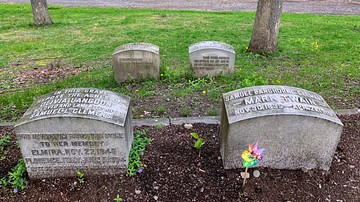
Mark Twain is the pen name of Samuel Langhorne Clemens (1835-1910), an American humorist, journalist, lecturer, and novelist. He was the voice of his generation and one of the most celebrated authors of the late 19th century, writing some of America's best-known and most memorable works of literature: The Adventures of Tom Sawyer, Life on the Mississippi, and The Adventures of Huckleberry Finn.
Through these and other works, he had a profound effect on the development of writing in America, influencing numerous authors of the 20th century, such as Ernest Hemingway (1899-1961). With a career that spanned over four decades, Twain shaped the world's view of America. His rich sense of humor was evident in both his novels and lectures, but Twain's biographer Albert Bigelow Paine believed that he was more than a humorist; he was a philosopher, a prophet, and a humanitarian.
Early Career
Samuel Langhorne Clemens was born in Florida, Missouri, on 30 November 1835. His father, John Marshall Clemens, was educated as a lawyer but chose instead to become a merchant, albeit not a very successful one. In 1839, when Twain was four, his father moved the family to Hannibal, Missouri, a small town along the Mississippi River. In Hannibal, John Marshall returned to the practice of the law, eventually being elected justice of the peace. When he died in 1847, leaving the family in debt, Twain was forced to quit school; he was not quite twelve. Twain, like his older brother Orion before him, was apprenticed to a local printer. When Orion bought a small newspaper, the Hannibal Journal, Twain joined him as a typesetter. The newspaper was operated out of the family's basement. On the days when Orion was absent from the paper, Twain would write small parodies about local characters and conditions, and circulation increased.
In 1853, at the age of 18, Twain left home, working as an itinerant printer in St. Louis, New York, and Philadelphia. By the time he returned from the East, Orion had moved the family to Keokuk, Iowa. Twain would remain in Keokuk with Orion until 1857 when he decided to go to Brazil and the Amazon River. He began the long journey at Cincinnati, working as a printer, until spring. Aboard the Paul Jones, headed to New Orleans, he met a riverboat pilot named Horace Bixby, and after a lengthy conversation, decided to forego the Amazon and become a riverboat pilot. 18 months later, he was considered one the best and most careful on the Mississippi, but, with the outbreak of the Civil War in 1861, the Confederates blockaded the river, stopping all river traffic.
Following a short two-week stint in the Confederate Army, Twain traveled west by stagecoach, hoping to become rich in the silver mines of Nevada. Orion, who had a federal appointment in the Nevada Territory as secretary to the governor, went with him. But with little success as either a miner or prospector, Twain used his free time to contribute short articles to the Territorial Enterprise, a Virginia City, Nevada newspaper owned by John Goodman. It was there that he began to use the name Mark Twain, a river term for two fathoms of water. His new name and humorous articles made him famous along the Pacific Slope. Recognizing his talent, Goodman offered Twain the job as editor of the Enterprise at 25 dollars a week. After two years in Virginia City, he moved to San Francisco where he worked for the Morning Call while contributing to the Golden Era and The Californian.
Travels & Writings
With an invitation from James Gillis, Twain left San Francisco and traveled to the Calaveras County mining camp. While learning pocket mining, he listened to the miners' stories over a campfire; one of the stories became The Celebrated Jumping Frog of Calaveras County (1865). The story eventually made its way to the Saturday Press; it was his first successfully published story. The next four years found Twain traveling and writing. His sense of humor and frank observations brought him to the attention of newspapers across the country. He returned to San Francisco in March of 1866 where the Sacramento Union sent him to the Sandwich Islands (Hawaii) to write a series of letters on his observations.

After returning home, he toured the West Coast giving a number of successful lectures on the Islands. His time in the West was the source of inspiration for his Roughing It (1872). After six years as a miner, printer, and lecturer, he headed east in search of greater challenges. Upon his arrival in New York, he was commissioned in June of 1867 by a San Francisco newspaper to write a series of letters on a five-month voyage aboard the Quaker City to the Holy Land with a number of American tourists. His letters were published in both the New York Tribune and Alta California. Returning to New York, he collected the letters into Innocents Abroad (1869). Both Innocents Abroad and Roughing It sold well.
Marriage & Literary Success
Everything seemed to be going his way. Twain was having success as both an author and a highly-paid lecturer. He invested in a publishing house and a promising typesetting machine, eventually taking on the entire financial burden. In February of 1870, he married Olivia Langdon, a coal heiress from Elmira, New York, and moved to Buffalo, albeit temporarily, where Twain was editor of the Buffalo Express. He and Olivia would have three daughters: Jean, Clara, and Suzy. He sold his interest in the Express in 1871 and moved to Hartford, Connecticut where he built a home — spending his summers in Elmira at Quarry Farm.
In 1872, in collaboration with Charles Dudley Warner, he made his first attempt at a serious novel The Gilded Age (1873). The book not only gave its name to the post-Civil War age of "unbridled individualism and speculation" but also gave "permanent and imaginative form to the mixed qualities of the period" – greed, political and commercial corruption as well as opulence and squalor (Mead, 305). Although the book sold well, Twain still considered it a failure. While living in Hartford, he penned two of the most famous works: The Adventures of Tom Sawyer (1876) and The Adventures of Huckleberry Finn (1884).
Financial Difficulties & Lecturing
By the end of the 1880s, with the failure of his business investments, Twain was beginning to suffer tough times. These financial failures forced him to sell his home and move to England in 1891. By 1894, he was bankrupt but vowed to pay off his debts. According to Robert Mead in his Literature of the American Nation, whenever Twain was having financial difficulties, he would often turn to lecturing. In fact, Mead believed some of Twain's best work was done when he was lecturing. After a successful lecture tour the following year, he returned to England debt-free in 1896.
Through his lectures and novels, he gained a reputation abroad, especially in England, for his 'defiantly' American outlook. Whether lecturing or writing, he spoke out against what he perceived as a corrupt yet prosperous post-Civil War America. By the 1890s, the tolerance he had once demonstrated in his books and lectures was replaced by attacks on what he considered to be the "folly of humankind" (McMichael et al., 222) The novel Pudd'nhead Wilson (1894) and the short story The Man that Corrupted Hadleyburg (1900) reflect a vision of humanity as being "greedy, oafish, hypocritical, cruel, and predatory" (McMichael et al., 222). This change in attitude may have been due to a series of crises in his life: the death of his wife and daughter and the failure of his business investments.
Twain's attitude and negativity did not go unnoticed by many in the reading public. One of his most beloved characters was Huck Finn, a small-town boy who befriended a runaway slave, and together they sailed down the Mississippi on a raft. Yet, despite its popularity, the book has been banned in a number of schools and libraries across America. Aside from the book's coarse language, most of the criticism stems from the close relationship between Jim and Huck. It was called "trash" and "suitable for the slums" by the Concord Public Library Committee. Twain did not consider the Committee's comments serious enough to respond, only to say the remarks would increase the book's sales.

Huck Finn remains to this day a point of contention with parents, schools, and libraries, but Huck was not the only Twain character to be considered offensive. A decade earlier in The Adventures of Tom Sawyer, young Tom was viewed by many to be a bad role model for young readers due to his coarse language and poor moral character. The book has received criticism similar to that of Huckleberry Finn and was banned in many schools and libraries for its portrayal of racial stereotypes. Whether banned or not, both books continue to be enjoyed by countless readers.
Later Life
As he had grown older, Twain became more and more critical of the times in which he lived. His attitude may have been due to a changing American society. Twain had grown up in a slave-holding culture, the agrarian South, a world he detested. It was a belief that often appeared in his books. Industrialization and technological advances had changed the America he had once known.
Through his observation of an everchanging society, Twain lost his tolerance of the country's ills. This intolerance is evident in his book A Connecticut Yankee at King Arthur's Court (1889). It was not only a comic romance but also a book of social criticism. While the book's primary focus is on English society, its target may well have been America. In A Connecticut Yankee, a Hartford mechanic, Hank Morgan, awakens in 6th-century England during the age of King Arthur. Hank begins to introduce several of the benefits of the late 19th century, but some of these changes are not well-received, especially by the medieval Church. The book criticized the respected traditions of England: the monarchy, the nobility, and the Anglican Church. Hank, as the king's principal advisor, issues a proclamation stating that the king had died without an heir, and a new government would be created and put in place. The monarchy is no longer, all political power is in the hands of the people, there is no nobility or privileged class, and there is no established church. It was to be an ideal society. Unlike his earlier work, The Prince and the Pauper (1881), which had been praised, A Connecticut Yankee was not well-received in England.

In London, where he had lived for four years with Olivia and Clara, he was making plans for another book. He was awaiting the arrival of his other two daughters Suzy and Jean when he received word that Suzy had died of meningitis. When Twain returned home to America in 1901, he was treated like a conquering hero, a man of letters. In 1903, Olivia became ill, and for health reasons, Twain and his wife moved to Italy where Olivia died in Florence in 1904. Their daughter Jean died in 1909. Returning to the United States, he moved to Redding, Connecticut, where he would spend the remainder of his life. On 21 April 1910, Mark Twain died from a heart attack. His autobiography was published posthumously in 1924.








